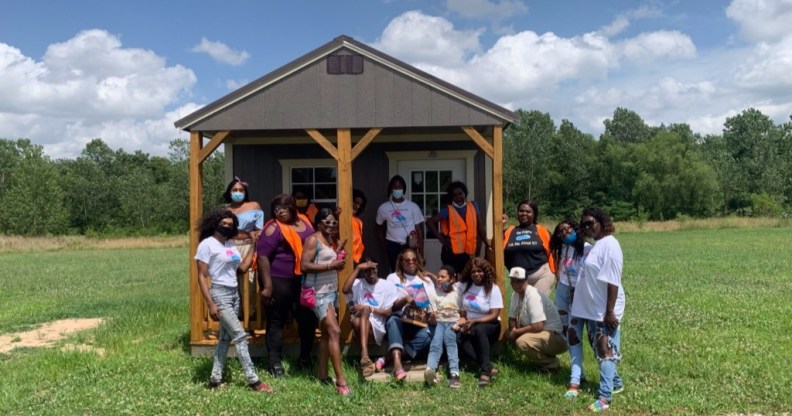Grassroots campaign raises over $250,000 to build neighbourhood of ‘tiny homes’ for Black trans women

Members of My Sistah’s House visiting a local supplier they’re considering buying the tiny hosues from. (GoFundMe/My Sistah’s House Memphis)
A grassroots organisation has raised over $250,000 to buy a plot of land and build 20 tiny homes for Black trans women and non-binary people.
Tiny homes are a relatively modern phenomenon, seen in TV shows like Grace & Frankie and reality TV like Tiny House Hunters.
My Sistah’s House, a small non-profit that helps Black trans women and non-binary people with safe housing, bail assistance and the legal aspects of transitioning, is based in Memphis, Tennessee.
The group launched a GoFundMe in June and has since raised $262,435 – the plan being to buy a plot of land, and 20 pre-made “tiny houses”, so that by the end of the year, safe housing is available for Black trans women and non-binary people.
“We have started the land acquisition stage of the process and selecting a supplier for building materials,” the organisers of the fundraiser shared on the page.
“Once we close on the land we will be updating folks with new developments. Our timeline has us at completion of the first three homes by December of this year.”
Since it was founded in 2017, My Sistah’s House has helped provide temporary shelter to many people in the Memphis area, but has struggled to help people into permanent homes.
Kayla Gore, co-founder of the non-profit, told NBC that this comes down to the “endless cycle of poverty and homelessness” that Black trans women get locked into.
The speed at which they raised funds for the tiny housing is promising, she added, saying that she hopes this model could be used by other grassroots advocacy groups in future.
“It’s been super overwhelming to see the support that’s coming in so fast and so rapidly,” Gore said.
Other trans-led grassroots groups have similar ideas.
Trans United Leading Intersectional Progress, or TULIP, is based in Louisiana. It’s fundraising $400,000 to buy and refurbish a six-bedroom house, which will provide a safe space to stay and a pathway to home owenership for trans and gender non-conforming people in New Orleans.
“Housing really is this first thing that is such a necessity for people to be able to access all of these other things,” said Dylan Waguespack, co-founder of TULIP and public policy director for True Colors United.
“If you are experiencing the intersection of racism and transphobia that leads to social and economic marginalisation without access to some kind of permanent housing support, it’s going to be very difficult to fight to try and access that stability that a lot of people in our country take for granted.”

